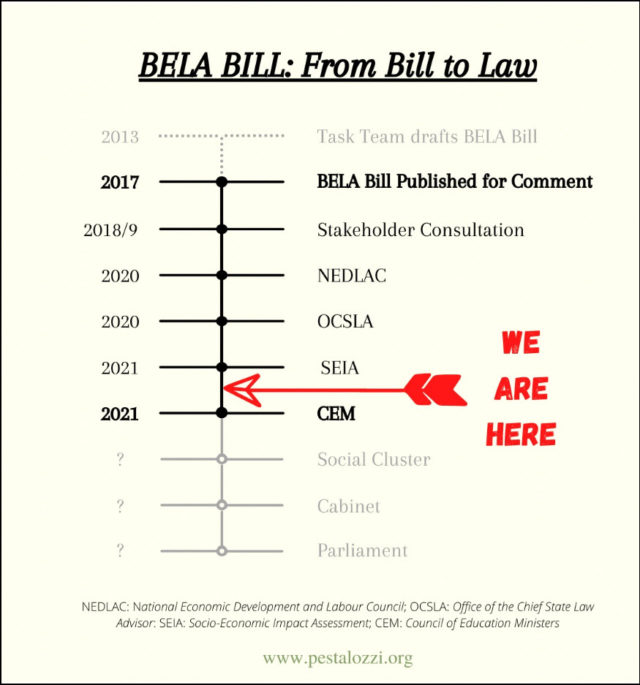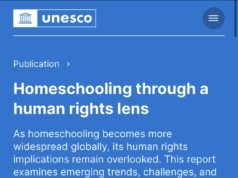
The BELA Bill rolling on without small schools?
The Department of Basic Education (DBE) is currently preparing the Basic Education Laws Amendment (BELA) Bill for submission to parliament. The BELA Bill will result in major changes to the laws governing schooling and it will set the legal framework for education for the next ten or even twenty years. Of major concern to small schools is that no specific provision is made in the BELA Bill for cottage schools or centres.
According to the National Education Policy Act (NEPA) the minister must first consult with the Council of Education Ministers (CEM) before she can introduce new legislation in parliament. This council consists of the provincial education ministers and the national education minister. It is expected that the BELA Bill will soon be discussed at the CEM.
Home educators have been writing to the provincial education MECs (Members of the Executive Council) and ministers responsible for education. They have been asking that the ministers meet with home educators and with the Pestalozzi Trust before the CEM meeting so the ministers can raise home educators’ concerns at that meeting.
The role of small schools in South Africa
- Does South Africa need small schools?
Over the last decades, the school system has failed to realise the right to basic education of tens of thousands of children. Some of these children have unique educational needs that cannot be met by schools while others could not be placed in a suitable school in their area. This situation was exacerbated by the pandemic, as many families are not willing to send their children to school. Whereas home education is a solution for some of these children, for many families it is not an option. This has resulted in thousands of alternative educational institutions being established.
- Where do small schools fit into the regulatory framework?
In s29(3) the Constitution guarantees everyone’s right to establish and maintain independent educational institutions. There are a few conditions that regulate the exercise of this right. These are that the institution does not discriminate on the grounds of race, maintains standards that are not inferior to the standards at comparable public educational institutions and that it is registered with the state.
However, alternative educational institutions, like small schools, struggle to register, due to their size, their unique operating model and the high costs of regulatory compliance. This shouldn’t be the case. The government should be facilitating their right to operate an educational institution, so that they in turn can realise the right to education of those children who cannot be accommodated in schools or at their own homes. However, the BELA Bill does not address this form of educational provision.
- Has the DBE engaged with small schools?
Small schools are a vital part of the education sector but need special regulations that acknowledge their special circumstances. The DBE should have consulted with small schools and proposed ways to make it easy for small schools to register. Unfortunately, there has been no consultation with alternative educational institutions.
The Pestalozzi Trust has raised this issue with the DBE on numerous occasions. We are happy to report that on the face of it the DBE does not seen hostile to small schools in principle. They, however, appear to have other priorities and have said they will look at the issue in the future. Therefore, while the DBE waits to get around to it, alternative educational institutions are in danger. Small schools face closure by provincial education officials and a host of other legal problems.
What can small schools do?
They have a once in a decade opportunity to shape the future of alternative education in South Africa. This is the chance to place alternative educational institutions on the agenda of the provinces and the DBE and ensure their rights are secured.
As we have pointed out, a small school at present needs to register as an independent school in order to be able to operate legally. Registration of independent schools takes place through provincial education departments. The provincial education ministers are therefore the best people for small schools to approach at this stage.
The urgent need now is to make the ministers aware of their existence and of the important role small schools play in the education sector, and then to ask them to ensure that the BELA Bill does not go forward unless their issues are addressed. Below we provide guidelines for letters for small school owners, as well as guidelines for the parents, who might also be interested in stating their case.
Write to your provincial MECs or education ministers and ask them to urgently consult with alternative educational institutions and with the Pestalozzi Trust so that the BELA Bill can be amended to include provisions that promote the best interests of your learners and allow you to exercise your constitutional rights.
Guidelines if you are an owner or principal of a school
In your letters you should:
- Explain how your institution assists children with unique needs that cannot be met by mainstream schools.
- Explain why it is difficult for small educational institutions to meet the stringent registration requirements for independent schools.
- Outline how the COVID pandemic has impacted your school. (If it has – perhaps you were unsure if the Disaster Regulations applied to you and if future ones will, or perhaps you have seen an influx of learners.)
- Ask the minister to meet with the owners and operators of alternative educational institutions as well as the Pestalozzi Trust. The Pestalozzi Trust will be able to share research into alternative educational institutions and highlight the challenges you face.
Click here for a directory of all the provincial education ministers.
Please Bcc homeschoolfreedom1996@gmail.com in your letter, to enable the Pestalozzi Trust to have a record of the letters written to government.
Guidelines if you are a parent at a school
Parents of learners in your school (and even some older learners) are welcome to use the template letter we have drawn up to write letters of protest to the relevant minister. PLEASE NOTE: The red letters and the words between brackets in the template letter should not be included in the parent’s letter. The parent should replace it with their own details.
If you would like to write an anonymous letter please take the following steps:
- Write your letter and save it as a PDF.
- Ensure the letter doesn’t identify you.
- Explain in your letter why you feel you have to be anonymous.
- Send it to homeschoolfreedom1996@gmail.com and mark it “anonymous”.
- We will forward it to the relevant officials.
You have a unique opportunity to make an impact and change this situation. Your letter can make a huge difference!





